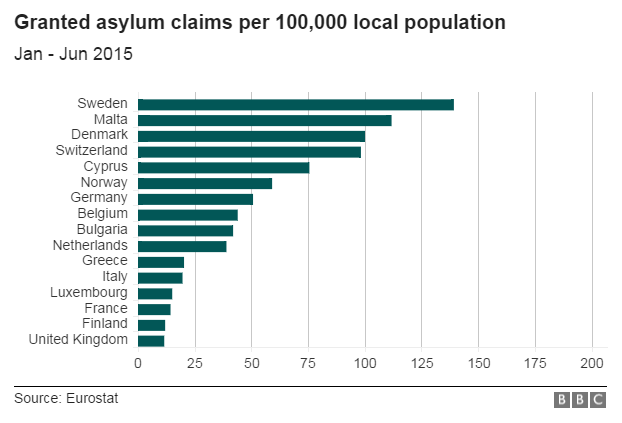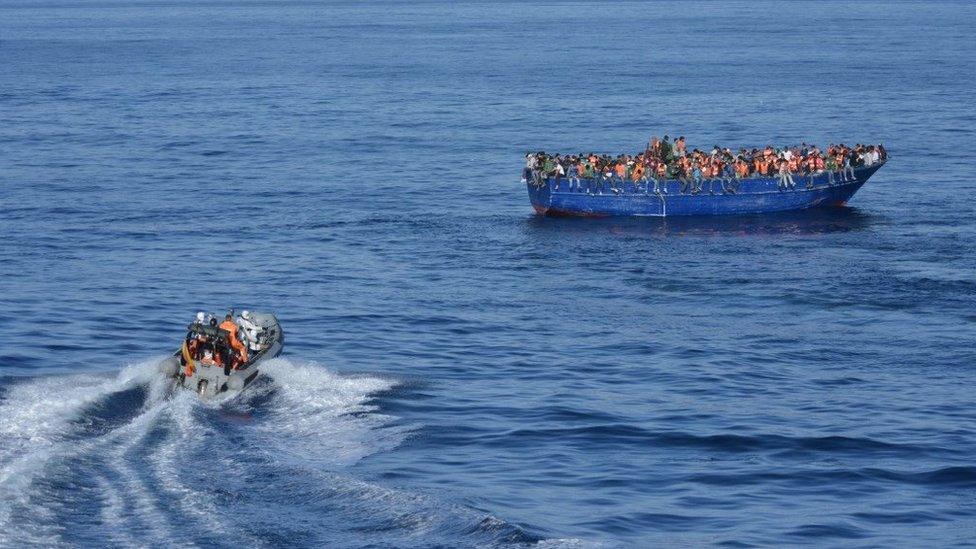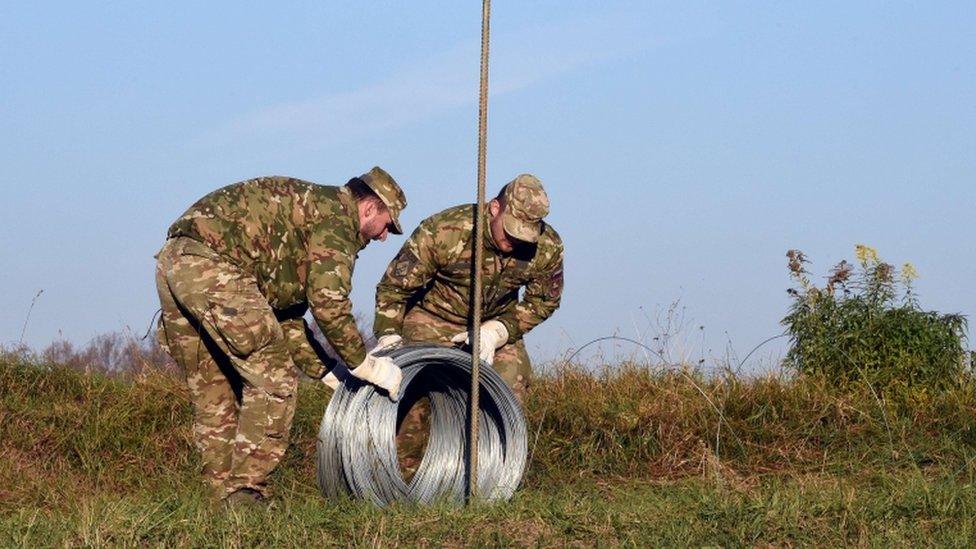Migrant crisis: Swedish border checks introduced
- Published
There is no simple solution to the migrant crisis, as the BBC's Katya Adler reports
Sweden has brought in temporary border checks to control the flow of migrants into the country.
It said it took the step because a surge in new arrivals had resulted in a threat to public order.
At a summit in Malta, EU Council President Donald Tusk said that saving the EU's Schengen rules on free movement was a "race against time".
The EU has agreed to a €1.8bn (£1.3bn) fund to help Africa tackle "the root causes of irregular migration".
But some African leaders have already criticised the sum being offered as insufficient.
Some 150,000 people from African countries such as Eritrea, Nigeria and Somalia have crossed the Mediterranean from Africa this year, but this has been dwarfed by the arrival of some 650,000 people - mostly Syrians - via Turkey and Greece.
Tensions in the EU have been rising because of the pressures faced by those countries where most migrants initially arrive, particularly Greece, Italy and Hungary. Many then head to Germany or Sweden - the two nations regarded as the most welcoming to refugees - to claim asylum.
Mr Tusk said recent developments in Sweden, Germany, Slovenia and elsewhere had shown "with utmost clarity the huge pressure member states are facing".
Donald Tusk: "None of us can manage the phenomenon (of the migrant crisis) on our own"
'Another system' needed
Sweden said the temporary controls came into effect at midday local time on Thursday and will last initially for 10 days.
Checks began on trains crossing the Oresund Bridge between Sweden and Denmark and at terminals for ferries arriving from Denmark and Germany. Police indicated not all vehicles crossing the bridge would be checked.
Nearly 200,000 migrants are expected to arrive in Sweden this year, more per head of population than any other EU nation.
"This is not an issue for one or two or three countries - this is an issue for the whole European Union," Swedish Prime Minister Stefan Lofven said at the Malta talks. "We need another system - that is obvious."

More on the migrant crisis

Katya Adler - How Sweden's far-right has gained from the crisis
Crisis in graphics - Migrant countries of origin, routes and destinations
Impact of arrivals - How one German city is coping

Swedish Interior Minister Anders Ygeman said the centre-left government had acted "in order to obtain security and stability... not to limit the number of asylum seekers, but to get better control of the flow of asylum seekers to Sweden".
Swedish immigration officials say the introduction of temporary border controls will help them register new arrivals and prevent people from staying in the country illegally.
Fredrik Bengtsson, spokesman for the Swedish Migration Agency, said it was currently picking up people by bus at the border and driving them to its offices, but "once they get there quite a lot don't enter and get registered but disappear".
Cash for help
The summit of EU and African leaders in the Maltese capital Valletta was planned after about 800 people died in a migrant boat sinking off Libya in April.
Clive Myrie reports from Ethiopia on the Eritrean children fleeing to safety
It has been looking at ways to reduce the flow of migrants by helping tackle economic and security problems in African states, and at accelerating repatriation of failed asylum-seekers.
African leaders are insisting on a much clearer path for smaller numbers of their citizens to migrate officially to Europe.
Also on Thursday, the President of the European Commission, Jean-Claude Juncker, asked EU member states to donate a total of €2.5bn to a fund to support Turkey's efforts to tackle the migration crisis.

Analysis: Chris Morris, BBC News, Valletta

Migrants are continuing to arrive on the Central Mediterranean route to Spain and Italy
It is almost always a good idea to get together, shake hands and smile - the importance of political engagement at the very highest level should not be under-estimated.
But there are still some fairly fundamental differences of emphasis between Europe and Africa when it comes to how best to tackle the migration crisis.
That is hardly surprising because it is a one-way street - an unequal partnership.
And efforts to balance things up involve policies such as conflict resolution and poverty reduction that will take decades to bear fruit.
The trust fund established today is new money and it will fund new projects. African leaders would like it to be bigger, but overall this deal can have a positive impact.
One practical example is a European promise to reduce the cost to migrant workers of sending money back to Africa. Remittances remain a backbone of many national economies.
Nevertheless there remains deep scepticism in Africa about European demands to accept the return of far more of the people that EU countries want to expel.
That will remain a serious point of contention.

Despite a series of high-level meetings over the migration crisis, the EU remains deeply divided on how to deal with the issue.

Slovenian soldiers have begun work on "obstacles" along the country's border with Croatia
Hungary has criticised Germany's announcement that it planned to send more Syrian refugees back to the first EU country they had entered - excluding Greece - and Croatia has condemned its neighbour Slovenia for building a razor-wire fence along their mutual border.
EU leaders have agreed a controversial programme to redistribute thousands of migrants - but so far only about 130 have been successfully moved from Greece and Italy.

A note on terminology: The BBC uses the term migrant to refer to all people on the move who have yet to complete the legal process of claiming asylum. This group includes people fleeing war-torn countries such as Syria, who are likely to be granted refugee status, as well as people who are seeking jobs and better lives, who governments are likely to rule are economic migrants.